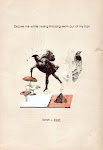I was checking out an actress’s website the other day and her profession was listed as “actor.”
I’m sad about the widespread extinction of the –ess suffix. It clung to female thespians for a long time, but seems increasingly absent. “Actor” sits so awkwardly on women. I’d insist on “actress.” To be honest, I’d prefer to be a poetess, but that died out long ago. Ditto sculptress. And among the –ess words now dying an institutionalized death are waitress and stewardess. By that I mean society seems determined to kill them.
“Hello, my name is Jane and I’ll be your server tonight.”
“Flight attendants! Please be seated!”
Some believe they’re being forced out in the name of equality, but I don’t buy the argument that –ess is a “sexist” suffix. There’s nothing demeaning about it unless you enter the equation with a sexist attitude to begin with. If you google postmistress, you’ll get Wikipedia telling you it’s been dropped in favor of postmaster, which “has no gender quality.” Which is a lie. Master has no "gender quality?" Isn’t it a worse chauvinism to have to give up your true calling for the masculine version? Couldn’t we all change to the feminine version?
I think the feminization of professions/roles is an enhancement of the relevant words, and the shift away is a linguistic impoverishment. Is “Diana the Huntress” the same as “Diana the Hunter?” It doesn’t have to be just –ess; other forms are also lovely. For example, as if the word connoisseur weren’t beautiful enough, think of Sharon Olds’ “connoisseuse of slugs.”
I know I can’t stop language from changing, and luckily there are some words in which the –ess suffix appears fossilized. No one seems ready, for instance, to give up temptress and adultress, which pack more wallop than their male (generic) counterparts ever could. And the -ess is also permanently parked at the end of stately titles like baroness, empress, countess, princess, and the magical professions of enchantress, goddess, sorceress and priestess. If you can break into those fields, your femininity is safe.
Monday, March 08, 2010
Subscribe to:
Post Comments (Atom)




14 comments:
You have a long collecttion of blogposts now; do you think you should have a "search this blog" widget now?
I think you do!
:)
Isn't there one in the upper left corner? I see one, but find it works like crap.
I want to be concert master because I have mastered the art of violin. I do not want to be concert . I've already fucked a conductor and it was not all that hot beans.
Rebecca, concert master
Happily writer has always been just that and I've never wanted to be a poetess. I see your point but I respectfully disagree. Too much belittlement has accrued to most of those "ess" words. I am happy that besides priestesses [not acknowledged by established churches since Roman times] shaman can be man or woman, and the "man" part is not gender specific. Most of the "ess" ending suggest sexual inferiority, including the temptress one. I'm happy the words are changing.
I meant to write I don't want to be concert mistress. Something must have caught my attention. Like the cat walked by or something ;)
Rebecca
In this rising wave of gender suffixes widow/widower has always confused me. Here is my silly theory. Since widow can be a verb then it seems a widower is an "individual" who carries or has to deal with the grief. The er is not associated with a woman quite possibly because they were not individuals but objects. Used, shameful objects if you will. They became the loss. In the orthodox Indian caste system widows still carry the stigma of being Untouchables. See Deepa Mehta's film Water for example. Spiders apparently lucked out. They are all widows.
I have a poem called 'The Poetess' which my wife objected to when I wrote it. The simple fact is that the only place that gender is referred to in the whole piece is the title. What should I have called it? 'The Female Poet'? Gender is not irrelevant. The poem is addressed to a female.
So when are we going to get the Oscar for 'Best actor in a female role'? Maybe it's my age but I find political correctness tiresome. I understand where it comes from but I wish people would listen to common sense. The next thing you know I'll have to call my wife 'my husband'.
Don't get me wrong, I'm very pro-women but I think we have bigger issues to worry about - like global warming - than what we call each other. And the simple fact is that bigots and sexists will always find a way to be bigoted and sexist.
I read this while eating a watercr sandwich. I was very impr, I gu.
God bl you.
I must conf: I read this while eating a watercr sandwich. I was very impr, I gu.
God bl you.
I don't find the -ess in any way demeaning. The problem lies in the mind of the language user.
There are other words that are overtly demeaning - like "bitch" and "slut" and "cunt" - and yet some women set to work trying to "reclaim" them as points of pride. Go figure.
Ron. - I bet you're dressed to empress today...
I have always loved being described as a songstress.
This was an interesting discussion!
"Songstress" is a good one.
i think the -ess will apply to you for some time as you are referred to as, The Godess of Poetry.
I have worked as an actor/actress, and I accept and use either term. What I found was "actor" was the neutral, work-related term: tech rehearsal at 6, actors come at 8, etc. and "actress" referred to female actors in a variety of ways, some implying cliches about actresses that suggest something other than work.
"Poetess" carries a history of dismissing women poets as lesser or not as real or worthy as men poets, so I don't like it much.
I like seamstress.
Post a Comment